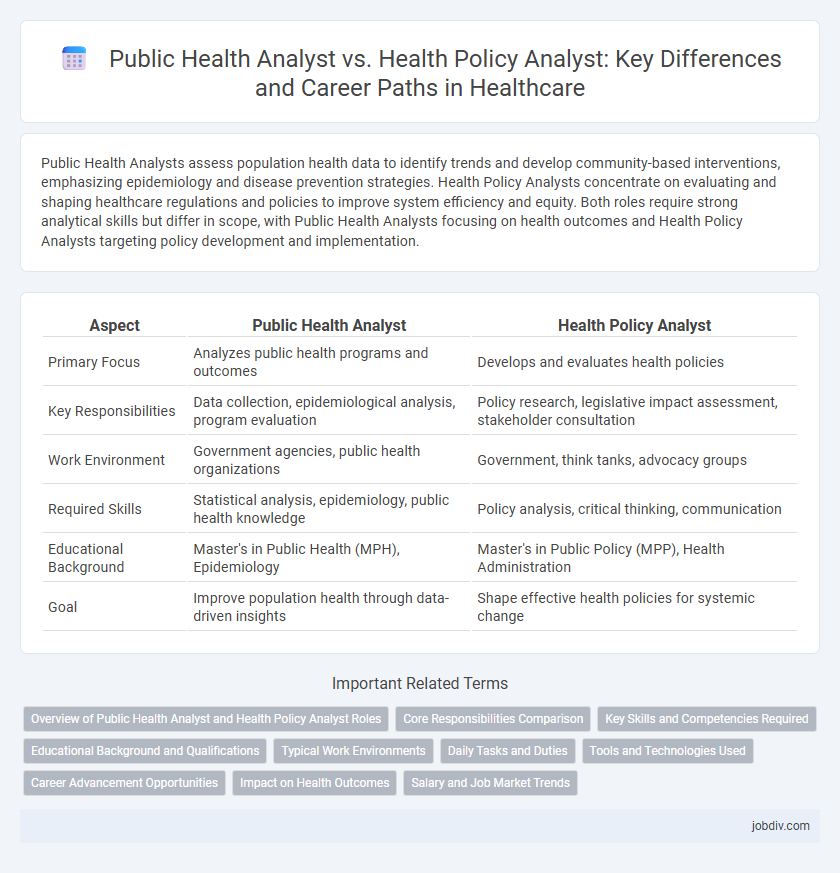Public Health Analysts assess population health data to identify trends and develop community-based interventions, emphasizing epidemiology and disease prevention strategies. Health Policy Analysts concentrate on evaluating and shaping healthcare regulations and policies to improve system efficiency and equity. Both roles require strong analytical skills but differ in scope, with Public Health Analysts focusing on health outcomes and Health Policy Analysts targeting policy development and implementation.
Table of Comparison
| Aspect | Public Health Analyst | Health Policy Analyst |
|---|---|---|
| Primary Focus | Analyzes public health programs and outcomes | Develops and evaluates health policies |
| Key Responsibilities | Data collection, epidemiological analysis, program evaluation | Policy research, legislative impact assessment, stakeholder consultation |
| Work Environment | Government agencies, public health organizations | Government, think tanks, advocacy groups |
| Required Skills | Statistical analysis, epidemiology, public health knowledge | Policy analysis, critical thinking, communication |
| Educational Background | Master's in Public Health (MPH), Epidemiology | Master's in Public Policy (MPP), Health Administration |
| Goal | Improve population health through data-driven insights | Shape effective health policies for systemic change |
Overview of Public Health Analyst and Health Policy Analyst Roles
Public Health Analysts assess community health data to identify trends and develop strategies that improve population health outcomes. Health Policy Analysts evaluate and formulate health policies by analyzing legislation, regulations, and their impacts on healthcare systems and public welfare. Both roles require expertise in data analysis, health economics, and policy development, but Public Health Analysts emphasize epidemiological research while Health Policy Analysts concentrate on policy formulation and advocacy.
Core Responsibilities Comparison
Public Health Analysts focus on analyzing health data, identifying trends, and assessing community health needs to develop programs improving population health outcomes. Health Policy Analysts specialize in evaluating health policies, conducting economic and regulatory impact analyses, and advising on policy formulation to influence healthcare legislation and funding. Both roles require expertise in data interpretation and health systems but differ in emphasis on program implementation versus policy development.
Key Skills and Competencies Required
Public Health Analysts require strong data analysis, epidemiology, and community health assessment skills to evaluate population health trends and program effectiveness. Health Policy Analysts must excel in policy development, legislative research, and stakeholder communication to influence healthcare regulations and policies. Both roles demand critical thinking, proficiency in statistical software, and a deep understanding of healthcare systems and social determinants of health.
Educational Background and Qualifications
Public Health Analysts typically hold degrees in public health, epidemiology, or biostatistics, emphasizing data analysis and population health management skills. Health Policy Analysts often possess education in public policy, health administration, or law, focusing on policy development, regulatory frameworks, and economic evaluation. Both roles require strong analytical abilities, yet Public Health Analysts prioritize statistical methods while Health Policy Analysts emphasize policy analysis and health system understanding.
Typical Work Environments
Public Health Analysts typically work in government agencies, non-profit organizations, and research institutions where they analyze health data to improve community health outcomes. Health Policy Analysts are often employed by legislative bodies, healthcare organizations, and consulting firms, specializing in developing and evaluating health policies to influence public health systems. Both roles require collaboration with stakeholders but differ in their primary focus on data analysis versus policy formulation.
Daily Tasks and Duties
Public Health Analysts primarily collect and analyze data related to community health trends, evaluate public health programs, and prepare reports to inform intervention strategies. Health Policy Analysts focus on researching, developing, and assessing health policies, interpreting legislation impact, and advising stakeholders on policy implementation and compliance. Both roles require strong analytical skills but differ in emphasis, with Public Health Analysts concentrating on data-driven health outcomes and Health Policy Analysts prioritizing policy development and regulatory frameworks.
Tools and Technologies Used
Public Health Analysts extensively utilize epidemiological software such as SAS, SPSS, and R for data analysis, alongside GIS tools for spatial health data mapping. Health Policy Analysts primarily rely on data visualization platforms like Tableau and policy simulation models, integrating databases such as Medicaid and Medicare for policy impact assessments. Both roles incorporate statistical programming and health informatics systems but diverge in specialized technologies aligned with their distinct analytical focuses.
Career Advancement Opportunities
Public Health Analysts often advance by specializing in epidemiology or health data analytics, enabling leadership roles in disease prevention programs and health surveillance. Health Policy Analysts typically progress through roles influencing legislative frameworks, focusing on policy development, advocacy, and regulatory compliance to shape public health outcomes. Both careers offer opportunities in government agencies, non-profits, and private sectors, with advancement linked to expertise in data interpretation, strategic planning, and stakeholder engagement.
Impact on Health Outcomes
Public Health Analysts evaluate community health trends and implement programs targeting disease prevention, directly influencing population health outcomes through data-driven strategies. Health Policy Analysts focus on developing and assessing healthcare legislation and policies, shaping systemic changes that affect access, quality, and equity in healthcare delivery. The combined efforts of both roles enhance health outcomes by integrating practical interventions with policy reforms to address public health challenges comprehensively.
Salary and Job Market Trends
Public Health Analysts typically earn an average salary ranging from $60,000 to $85,000 annually, reflecting demand in government and nonprofit sectors focused on community health initiatives. Health Policy Analysts often command higher salaries between $70,000 and $95,000 due to their specialization in legislative and regulatory frameworks impacting healthcare systems. Job market trends indicate robust growth for Health Policy Analysts driven by policy reforms and increased healthcare funding, while Public Health Analysts experience steady demand aligned with expanding public health programs and data analysis needs.
Public Health Analyst vs Health Policy Analyst Infographic

 jobdiv.com
jobdiv.com